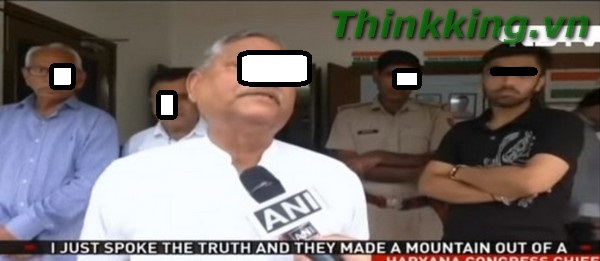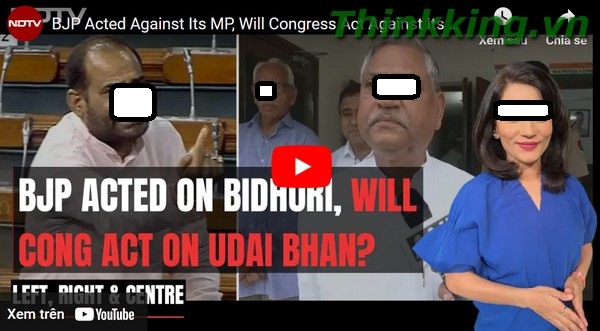Haryana Congress President Viral Video: Unraveling the Controversy
Welcome to Thinkking.vn, where we delve into the intricacies of a recent and significant event in Indian politics: the “Haryana Congress President Viral Video: Unraveling the Controversy. In this article, we will meticulously dissect the unfolding drama surrounding this viral video and explore its broader implications on responsible political discourse in India. Join us as we navigate through the details and unravel the layers of this intriguing controversy.

I. Introduction”Haryana Congress President Viral Video”
The recent buzz around the “Haryana Congress President Viral Video” has set the political landscape in India abuzz with discussion and debate. This incident, which has caught the attention of the nation, has highlighted the importance of responsible political discourse in today’s charged political environment. In this article, we will delve into the background of the controversy, explore its broader context alongside a similar incident involving the BJP, and emphasize the need for a more mature and responsible form of political discourse.
1. Background of the Controversy
The controversy surrounding the “Haryana Congress President Viral Video” erupted in the wake of a video that rapidly spread across social media platforms. In this video, Haryana Congress President Udai Bhan can be seen using language that many found inflammatory, particularly as it targeted none other than Prime Minister Narendra Modi. The incident unfolded on September 23 and swiftly escalated, catching the attention of the public and media alike. It is crucial to understand the backdrop of this controversy to grasp its implications fully.
2. Broader Context with BJP’s Controversy
Interestingly, the “Haryana Congress President Viral Video” controversy did not occur in isolation. Just prior to this incident, the Bharatiya Janata Party (BJP) found itself embroiled in a separate controversy involving one of its Members of Parliament (MPs), Ramesh Bhiduri. Bhiduri had made derogatory comments aimed at the Muslim community during a parliamentary session, sparking outrage and questions about the BJP’s handling of such incidents. Comparing the two controversies sheds light on the differing responses of major political parties in India when their members make controversial statements.
3. The Need for Responsible Political Discourse
In the midst of these controversies, the spotlight has turned to the critical need for responsible political discourse in India. The language used by political leaders has a profound impact on the public discourse and the nation’s cohesion. There is an increasing demand for leaders to engage in civil and constructive conversations, setting a positive example for the country. This incident serves as a stark reminder of the role leaders play in shaping political conversations in a diverse and pluralistic democracy like India.
In the subsequent sections of this article, we will delve deeper into the specific aspects of the “Haryana Congress President Viral Video” controversy and its implications for Indian politics and society.

II. Udai Bhan’s Defense: An Unwavering Stand
Amidst the storm of controversy surrounding the “Haryana Congress President Viral Video,” Udai Bhan, the central figure in this incident, has remained resolute in his defense. His unwavering stance has become a significant aspect of this unfolding drama, and it’s essential to examine the key components of his defense.

1. Refutation of Abusive Language
One of the central pillars of Udai Bhan’s defense is his vehement denial of using abusive language in his statements. He categorically refutes the allegations, asserting that his choice of words had not crossed the line into the realm of abusive language. This denial forms the foundation of his overall argument, contending that he had not transgressed the boundaries of responsible discourse.
2. No Mention of Names
Udai Bhan further reinforces his defense by emphasizing that he did not mention any names in his statements. By avoiding specific individuals, he seeks to create a buffer between his comments and any direct personal attacks. In his view, this omission of names makes his remarks a broader commentary rather than a targeted assault on particular political figures.
3. Claim of Speaking the Truth
Perhaps the most significant aspect of Udai Bhan’s defense is his claim that he spoke the truth. He contends that his statements were rooted in facts and did not contain any falsehoods. This assertion positions him as a champion of transparency and authenticity, framing his remarks as an exercise in truth-telling rather than an attempt to engage in malicious rhetoric.
4. Conditional Apology
Udai Bhan also offers a conditional apology as part of his defense. He indicates that if he had inadvertently made any inappropriate remarks or crossed any ethical boundaries, he would be willing to apologize. This conditional approach demonstrates his willingness to consider the potential consequences of his words, albeit while maintaining that he had not done anything wrong in his view.
5. Critique of the BJP
In a strategic move, Udai Bhan turns the spotlight onto the Bharatiya Janata Party (BJP). He criticizes the ruling party, suggesting that they should exercise greater control over their own Members of Parliament (MPs) and leaders. This criticism aims to redirect the narrative, emphasizing that similar incidents occur within the BJP’s ranks and highlighting what he perceives as a double standard in the handling of such cases.
Udai Bhan’s defense, characterized by his denial of abusive language, avoidance of naming specific individuals, assertion of truth-telling, conditional apology, and criticism of the BJP, reflects his determination to stand his ground in the face of controversy. It showcases his commitment to defending his reputation and the integrity of his statements, even in the midst of a heated political debate.
III. Political Context: Contrasting Responses of Major Political Parties
The “Haryana Congress President Viral Video” controversy gains more depth when viewed in the broader political context, particularly in light of a similar incident involving a prominent BJP Member of Parliament (MP), Ramesh Bhiduri. The responses of major political parties to these controversies reveal contrasting approaches and raise critical questions about the state of politics in India.
1. Bhiduri’s Controversial Remarks
Just before the eruption of the “Haryana Congress President Viral Video” controversy, Ramesh Bhiduri, a member of the Bharatiya Janata Party (BJP) and an MP, made controversial remarks that targeted the Muslim community during a parliamentary session. These remarks, widely perceived as offensive and divisive, ignited outrage not only among opposition parties but also within the BJP itself. Bhiduri’s comments created a parallel controversy that set the stage for comparisons.
2. BJP’s Response to Bhiduri
In response to the controversy surrounding Bhiduri, the BJP took swift and decisive action. The party’s leadership condemned his comments and implemented internal disciplinary measures against him. These measures included warnings, reprimands, or even the possibility of suspension, depending on the severity of the remarks. The BJP’s public stance conveyed a commitment to maintaining decorum within the party and a willingness to hold its own members accountable for their statements.
3. Comparisons and Contrasts
The parallel controversies involving Udai Bhan and Ramesh Bhiduri inevitably invited comparisons between the responses of the two major political parties to the conduct of their respective leaders. These comparisons underscored the differing approaches adopted by the Congress and the BJP in handling controversial statements made by their members.
While the BJP’s swift action against Bhiduri signaled a strong message that offensive rhetoric would not be tolerated within the party, Udai Bhan’s refusal to apologize and the Congress’s handling of the controversy presented a different narrative. The comparisons raised questions about the standards of accountability and decorum within these political parties and became a focal point of public discussion.
4. Implications
This political context highlighted the complexities of managing internal discipline and responding to controversies within the dynamic and diverse landscape of Indian politics. It brought into focus the importance of consistency and accountability in upholding the principles of responsible political discourse. Additionally, it underscored the role of political parties in shaping the conduct of their members and leaders and the extent to which they are willing to address and rectify controversial statements made by their own.
In essence, the contrasting responses to the Udai Bhan and Ramesh Bhiduri incidents not only added layers of complexity to the controversies but also revealed the differing approaches of the two major political parties in India. This shed light on their respective values and expectations regarding the behavior of their members and leaders, leaving a lasting impact on the nation’s political discourse and the public’s perception of political parties’ commitment to ethical and responsible governance.
V. Reflecting on the Implications: Accountability and Responsible Discourse in Indian Politics
The “Haryana Congress President Viral Video” controversy has sparked extensive discussions and prompted critical self-reflection within the political landscape of India. It gives rise to several profound implications that are crucial for shaping the future of Indian politics and governance.
1. Accountability of Political Leaders
One of the foremost implications of this controversy is the heightened focus on the accountability of political leaders. The incident has raised questions about the behavior and statements of individuals occupying positions of power and influence. It underscores the public’s demand for transparency and responsibility from their elected representatives. Leaders are increasingly being held to higher standards of conduct, and their actions are subject to greater scrutiny.
2. The Need for Responsible Discourse
The controversy surrounding the “Haryana Congress President Viral Video” draws attention to the critical need for responsible and respectful discourse within Indian politics. It serves as a stark reminder that the language employed by political leaders can have a significant impact on public discourse and societal cohesion. As such, there is an increasing expectation for leaders to engage in civil and constructive conversations, setting a positive example for the nation.
3. Ethical Standards in Politics
The incident has prompted a reevaluation of the ethical standards expected from those in positions of power. It raises questions about the moral compass that should guide political leaders in their actions and statements. This includes considerations of truthfulness, respect for diverse perspectives, and the avoidance of inflammatory or divisive rhetoric. Upholding ethical standards is becoming paramount in the public’s assessment of political leaders.
4. Role of Political Parties
The differing responses of political parties to incidents like this one highlight the role of political organizations in shaping the conduct of their members and leaders. It prompts discussions about how parties should address controversies within their ranks and whether they should adopt a more consistent and stringent approach to maintain decorum. The internal culture of political parties and their commitment to responsible governance are under scrutiny.
5. Public Perception of Leadership
The controversy has the potential to influence the public’s perception of political leadership. It can impact trust in political institutions and leaders’ ability to govern effectively. The manner in which leaders handle such controversies can either enhance or erode public confidence in the political system. Public perception of leadership has far-reaching implications for the functioning of a democracy.
6. Cultural and Linguistic Sensitivity
The incident has emphasized the importance of cultural and linguistic sensitivity in political communication. It underscores the need for leaders to be aware of regional nuances and the potential interpretations of their words, especially in a culturally diverse country like India. Political leaders must navigate the complexities of a multilingual nation while ensuring their words do not inadvertently offend or marginalize any community.
VI. Conclusion: “Haryana Congress President Viral Video”
1. The Ongoing Dialogue on Indian Politics
The controversy surrounding the “Haryana Congress President Viral Video” represents a crucial chapter in the ongoing dialogue on Indian politics. It has brought to the forefront a multitude of issues that encapsulate the complexities and challenges inherent in the country’s political landscape. This incident serves as a reminder that Indian politics is ever-evolving and constantly under scrutiny, and it highlights the need for continuous introspection and reform.
2. The Imperative for Responsible and Respectful Political Discourse
Above all, the “Haryana Congress President Viral Video” incident underscores the imperative for responsible and respectful political discourse in India. The language and conduct of political leaders have a profound impact not only on the political climate but also on society at large. The incident serves as a clarion call for leaders to rise above divisive rhetoric and engage in dialogue that promotes unity, inclusivity, and understanding.
As India continues to evolve as a diverse and pluralistic democracy, it is crucial for leaders to recognize the significance of their words and actions. The public expects transparency, accountability, and ethical conduct from those in power. The incident involving Udai Bhan and its surrounding controversies serve as a pivotal moment in the nation’s political journey, reminding all stakeholders of the importance of upholding the values of democracy and fostering a political environment that reflects the aspirations and diversity of its people.
In the wake of the “Haryana Congress President Viral Video” controversy, the nation’s leaders, political parties, and citizens are compelled to engage in thoughtful reflection and dialogue to shape the future of Indian politics. It is only through responsible and respectful discourse that India can continue to strengthen its democratic foundations and build a better future for all its citizens.
| Please note that all information presented in this article has been obtained from a variety of sources, including wikipedia.org and several other newspapers. Although we have tried our best to verify all information, we cannot guarantee that everything mentioned is accurate and 100% verified. Therefore, we recommend caution when referencing this article or using it as a source in your own research or report. |










